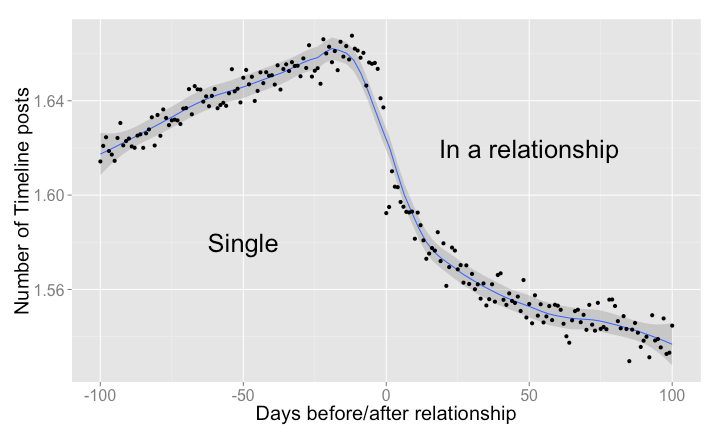Facebook has the data capabilities to tell me who will be the next person I’m going to date. Well, that’s a relief.
“Relationships start with a period of courtship: on Facebook, messages are exchanged, profiles are visited, posts are shared on each other’s timelines,” according to Facebook Data Scientist Carlos Greg Diuk.
Right before Valentine’s Day, the Facebook data team posted a six-series installment that shows a number of statistical graphs projecting the probabilities of a lasting relationship.
Each installment featured different sets of relationships, such as marriage, young love and soon-to-expire dating patterns among Facebook users.
To sum it up, Facebook data tracks people who went from “single” to “in a relationship” and vice versa.
The Facebook trackers keep tabs on Facebook users who are at least 23 years old and whose status says, “in a relationship” for at least three months.
Through the power of Facebook tracking, Facebook data finds a trend in the courtship and relationship patterns to predict the months in which they are likely to end.
Did your loving Facebook relationship expire, just like the chart projected it would? Facebook can tell you who your next compatible suitor will be … even though they have yet to tell me.
Apparently, a Facebook data scientist can take a scroll through your timeline posts and judge whom you’re interested in and who is interested in you.
“During the 100 days before the relationship starts, we observe a slow but steady increase in the number of timeline posts shared between the future couple,” Diuk’s said in a post.
It’s a good sign when the timeline posts begin to slow down after the first 100 days before the “in a relationship” status is made public, according to Diuk’s data.
In theory, this is because after the first 100 days of a relationship, a couple is spending more physical time together and less time corresponding through Facebook.
Facebook can also predict when the relationship might be nearing its end date based on the increase of moral support from Facebook friends on the wall. These messages can be vague but a high volume of pre-breakup correspondence is compared against the decreasing Facebook interaction between you and your soon-to-be ex-partner.
What I find amusing is that I’m only 24 years old and I don’t recall using Facebook as a means to define my past relationships. Is Facebook not taking into account those who don’t post a relationship status?
There were definitely a few relationships I shared on Facebook that bordered on the lines of “in a relationship” and “single” … and then, “in a relationship” again.
Ever since then, however, I have chosen to keep my relationship status completely hidden. I guess many of my fellow 23-year-old friends agree since they have followed suit.
I’m curious to know who exactly makes up the Facebook demographic the data team is following? Has there been any success in trending relationships through Facebook posts? Did these relationships ever materialize?
Although the data team may have some evidence that highlights the success and failures of relationships, I have a hard time believing this method applies to the general Facebook demographic, seeing as many people, in a relationship or not, leave their relationship status blank.
I also don’t message anyone that I’m dating on Facebook and they don’t message me.
Additionally, I did date someone for three years and we stopped being friends on Facebook after the first year of the relationship. Did that determine the demise, even though the break-up came two years later?
So tell me Facebook, am I going to be forever alone? According to these graphs, I just might be.




